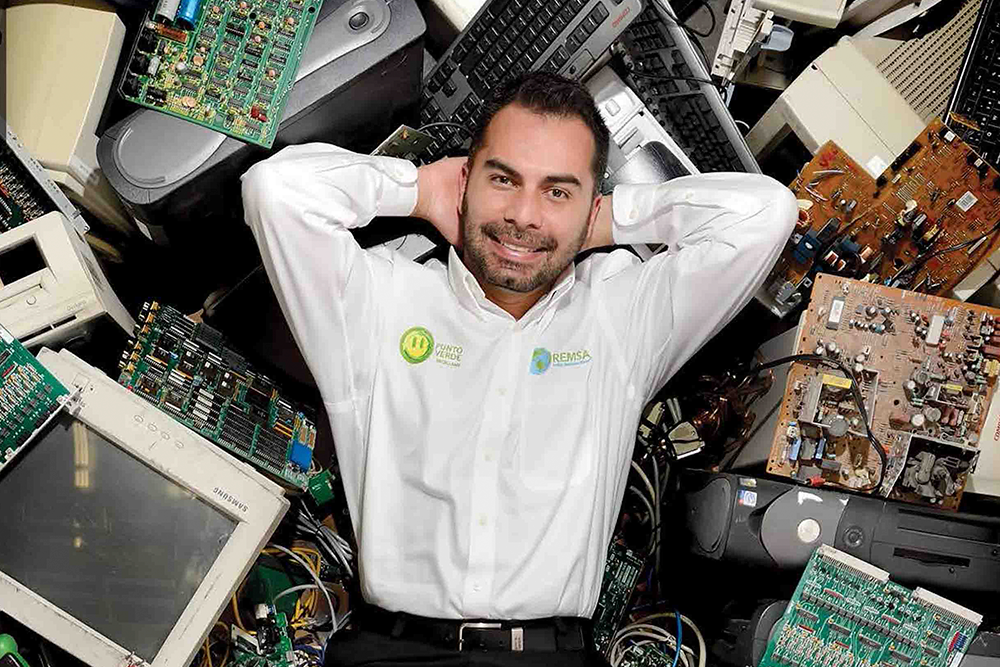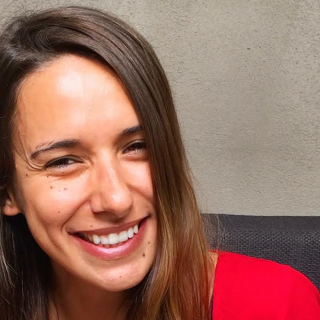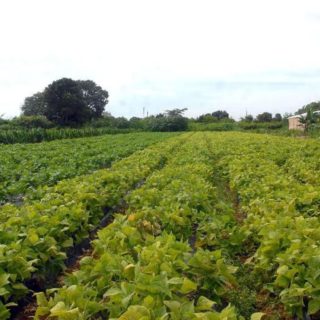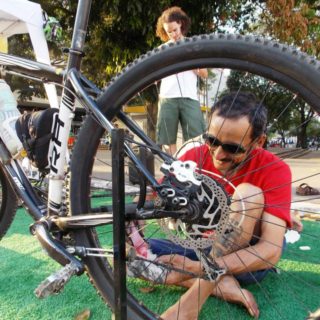Álvaro Núñez Solís has always had an innovative mind. While in high school, he invented a machine to help his mother by speeding up the process of making tortillas. He sold more than one hundred of these machines. In college in Monterrey, studying industrial engineering, he got tired of carrying his coat around all day, after his morning swim practice, so he invented a jacket that turned into a backpack. It became so popular that he convinced the university to sell his invention in the campus store.
However, Solis’s creativity and entrepreneurial spirit reached new heights when he was faced with the problem of e-waste, or electronic waste. During a semester on scholarship at University of Wisconsin, in the United States, he observed people throwing away radios, computers and other electronic equipment, but was surprised to learn that many were willing to pay to have them recycled in an environmentally friendly manner. That was when he decided to bring electronic recycling to Mexico.
More than 20 years later, under the slogan “Don’t store it away! Don’t throw it away! Recycle it away!” his business Recicla Electrónicos México S.A (Remsa) has collected over 9,000 tons of electronic waste, turning it into raw material for new products. Computer monitors are turned into tiles and bathroom fittings; the plastic in this equipment is separated out and used in the shoe industry.
But to accomplish all this, Solis had to find ways of educating people about the dangers of electronic waste. In order to spread the culture of recycling, he founded Punto Verde (Green Point) in 2005, an NGO that conducts garbage collection activities around the country, in a project called the Reciclón. Punto Verde also leads education and awareness campaigns for children and youngsters, and research and development on new recycling methods, as well as supporting environmental and social entrepreneurs and public policy proposals. The group has even participated in the drafting of legislation on the treatment of electronic waste in Mexico.
In an email interview with Believe.Earth, Álvaro told us a little bit about his life story and his new projects.
Believe.Earth (BE) – You’ve said in the past that your first electronic recycling business failed in Mexico because of the public’s mindset. People didn’t understand the idea of giving someone an old computer or printer, even if it was not being used. Today, more than 20 years later, how do you see your country’s view of recycling, especially in regards to e-waste?
Alvaro Solis (AS) – That mindset has changed a lot, and for the better. People are participating [in recycling] more and more, since the production of obsolete electronics keeps growing and and there just isn’t enough space for these objects (closets, laundry rooms or storage areas). Today, people are looking for recycling alternatives, for their businesses and for their households.
Now we are in the stage where people give their obsolete electronic equipment to companies that specialize in reuse and recycling, with the goal of increasing the reintroduction of recycled materials into new chains of production. This way we keep the equipment from falling into the hands of scrappers or informal companies that simply export and/or extract only the valuable parts of the electronic equipment, sending the rest to landfills or clandestinely incinerating the parts with no market value.
BE – Do you practice recycling in other areas of your daily life?
AS – Reuse and recycling have been a part of my life for the past 22 years, both personally and professionally. In my house, we have a system to capture water from the laundry and the showers. We then use this water for the garden. Some of the products used in my house, like the tiles in the patio and the backyard, as well as the bathroom fixtures, are made of silica sand, made by recycling obsolete computer monitors. As well, as we identify items we no longer use because our children are growing up (books, clothes, toys), we have a system to pass those things along to other families in our community.
At a professional level, we have other complementary initiatives that help increase our positive impact, both environmentally and socially. At the Ecomaker Store, we manage to reuse many parts, extraneous pieces and products from industries like electronics, automatization, robotics, mechatronics.
Meanwhile, the Red Eco Maker is an innovation workshop where we are constantly trying to develop innovative solutions to climate change, through a methodology based on the principle of circular economy [a regenerative system in which obsolete products are reused to make new products, minimizing waste and emissions, as opposed to a linear economy, in which products are made, used and thrown out] and the use of technology.
BE – In your opinion, how do the new generations relate to the issue of sustainability?
AS – I am convinced that our children and youngsters are creating a new society, in which we understand that we are a part of the natural system, that is, that we are not the system itself. That’s why it’s easier for them to take action towards environmental and social care, and not just for the economy. We have an initiative called EcoMakerKids, where children learn while playing and discovering.
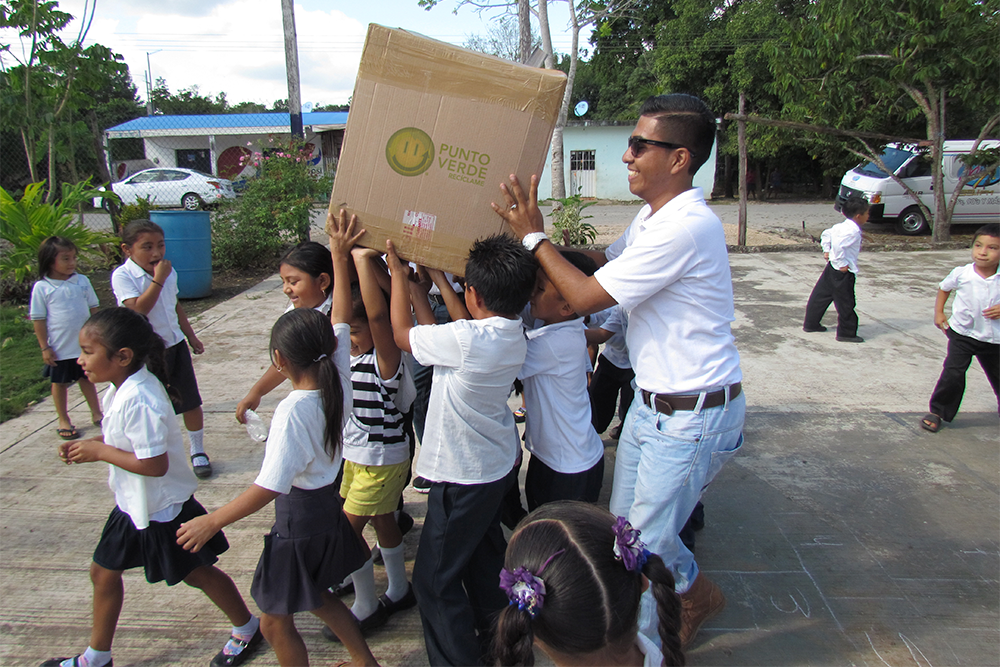
Children at a community school in Cancun receive a refurbished computer: “What is obsolete to some can offer a better future to children” (Álvaro Solís/Personal Archive)
BE – You invented a technology capable of turning computer monitors into tiles and bathroom fixtures. What was the invention process like, and what difficulties did you have in implementing this technology and reaching a final product?
AS – It took over five years of research. Insertion into the market was very difficult because, since this is a product made from recycled material, people thought it would be much cheaper. During these years we managed to produce and sell products at a regional level. We also had to go through a series of tests in order to validate our products’ properties and characteristics. After many versions in development, we reached version 5.0, where we managed to match the market price for comparable products. The biggest advantage is that we use mainly recycled materials, and therefore don’t exploit raw materials, such as marble powder.
BE – What inventions are you currently working on?
AS – Besides pushing along the initiatives we already have in place, I am currently working on a variety of projects, one of the most important ones being the expansion of our cell phone app (for Android and iOS systems), Junta, Entrega y Recicla (JER), into other countries. This app offers product collection and recycling services through four simple steps: the person gathers the products into a box and requests the service; they pay, according to the type of product, location, and weight of the package; deliver the package to the messenger, who collects it at the specified location; the product is then recycled and the person becomes a part of the solution. I am convinced that, in the face of such huge problems, we need disruptive solutions.
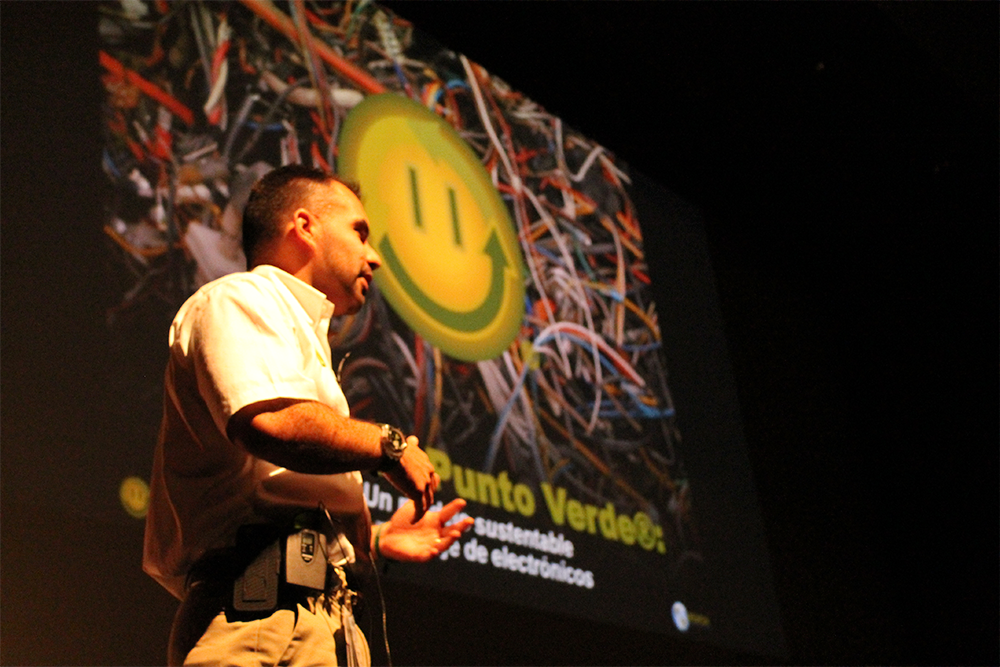
Álvaro Solís gives the presentation “La Causa Punto Verde: Un modelo sustentable de reciclaje de eletrónicos” (The Punto Verde Cause: A sustainable model recycling model for electronics), in Querétaro, Mexico (Álvaro Solís/Personal Archive)
BE – Do you believe in a sustainable future for Mexico and the planet?
AS – Yes, 100 percent. In my case, I am fortunate to have dedicated my existence to finding innovative solutions to climate change, through the circular economy, and through social and technological businesses. It is the desire to solve this problem that moved me to start so many projects during my years as an entrepreneur.
We must be aware that we can find, in solving the environmental problems that our planet is currently facing, great opportunities, and that, with perseverance, it is possible to develop socially sustainable businesses.
This is why I organize Emprender con Responsabilidad Ambiental y Social en México (Conducting Business with Environmental and Social Responsibility in Mexico), to help people start new sustainable businesses. We help them take project idea that is, from its conception, committed to sustainability, turn it into a business, and later a company with policies and procedures aligned with this school of thought. Such enterprises will allow us to satisfy our present needs without jeopardizing the resources of future generations. This way, business will contribute to environmental conservation, that is, with processes that lead to lower CO2 emissions, adequate water use, energy efficiency, products made from recycled materials and with recyclable packaging, and so on.
Álvaro Solís is an Ashoka fellow. Ashoka is a worldwide organization present in 84 countries and leads a movement in which any individual can be responsible for positive social transformation.
